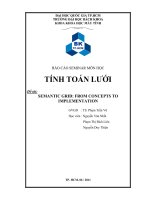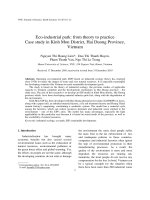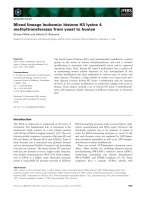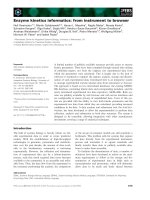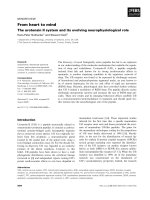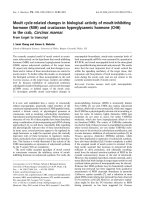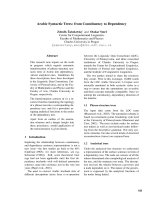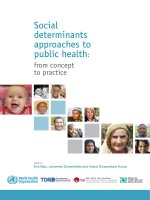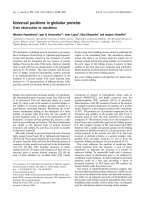accountability through public opinion from inertia to public action
Bạn đang xem bản rút gọn của tài liệu. Xem và tải ngay bản đầy đủ của tài liệu tại đây (5.02 MB, 538 trang )
From Inertia to Public Action
Sina Odugbemi and Taeku Lee, Editors
Public Disclosure AuthorizedPublic Disclosure AuthorizedPublic Disclosure AuthorizedPublic Disclosure Authorized
61639
ACCOUNTABILITY
THROUGH
PUBLIC OPINION
FROM INERTIA TO PUBLIC ACTION
ACCOUNTABILITY
THROUGH
PUBLIC OPINION
FROM INERTIA TO PUBLIC ACTION
SINA ODUGBEMI AND TAEKU LEE
Editors
© 2011 The International Bank for Reconstruction and Development / The World Bank
1818 H Street NW
Washington DC 20433
Telephone: 202-473-1000
Internet: www.worldbank.org
All rights reserved
1 2 3 4 14 13 12 11
This volume is a product of the staff of the International Bank for Reconstruction and
Development / The World Bank. The fi ndings, interpretations, and conclusions expressed in
this volume do not necessarily refl ect the views of the Executive Directors of The World
Bank or the governments they represent.
The World Bank does not guarantee the accuracy of the data included in this work. The
boundaries, colors, denominations, and other information shown on any map in this work
do not imply any judgement on the part of The World Bank concerning the legal status of
any territory or the endorsement or acceptance of such boundaries.
Rights and Permissions
The material in this publication is copyrighted. Copying and/or transmitting portions or all
of this work without permission may be a violation of applicable law. The International Bank
for Reconstruction and Development / The World Bank encourages dissemination of its
work and will normally grant permission to reproduce portions of the work promptly.
For permission to photocopy or reprint any part of this work, please send a request with
complete information to the Copyright Clearance Center Inc., 222 Rosewood Drive, Danvers,
MA 01923, USA; telephone: 978-750-8400; fax: 978-750-4470; Internet: www.copyright.com.
All other queries on rights and licenses, including subsidiary rights, should be addressed
to the Offi ce of the Publisher, The World Bank, 1818 H Street NW, Washington, DC 20433,
USA; fax: 202-522-2422; e-mail: pubrights@world bank.org.
ISBN: 978-0-8213-8505-0
eISBN: 978-0-8213-8556-2
DOI: 10.1596/978-0-8213-8505-0
Cover photograph: Joseph Luoman; ©iStockphoto.com / luoman
Cover design: Critical Stages
Library of Congress Cataloging-in-Publication Data
Accountability through public opinion : from inertia to public action / [edited by]
Sina Odugbemi, Taeku Lee.
p. cm.
Includes bibliographical references and index.
ISBN 978-0-8213-8505-0—ISBN 978-0-8213-8556-2 (electronic)
1. Government accountability. 2. Public services—Public opinion. 3. Organizational
effectiveness. 4. Performance—Management. I. Odugbemi, Sina. II. Lee, Taeku.
JF1351.A246 2010
320.01—dc22
2010032302
v
Contents
Contributors xi
Acknowledgments xxi
Abbreviations xxiii
Section I Foundations 1
1 Taking Direct Accountability Seriously 3
Sina Odugbemi and Taeku Lee
2 The (Im)Possibility of Mobilizing Public Opinion? 11
Taeku Lee
3 The Public and Its (Alleged) Handiwork 25
Sina Odugbemi
Section II Structural Context 35
4 Gaining State Support for Social Accountability 37
Harry Blair
5 The Workings of Accountability: Contexts
and Conditions 53
Enrique Peruzzotti
6 Associations without Democracy: The West Bank
in Comparative Perspective 65
Amaney Jamal
Section III Information and Accountability 83
7 Necessary Conditions for Increasing
Accountability 85
Arthur Lupia
vi Contents
8 Information Processing, Public Opinion,
and Accountability 95
Charles S. Taber and Everett Young
9 Information, Social Networks, and the Demand
for Public Goods: Experimental Evidence
from Benin 123
Leonard Wantchekon and Christel Vermeersch
Section IV Building Capacity through Media
Institutions (Media and Journalism) 137
10 Training Journalists for Accountability
in Argentina 139
Laura Zommer
11 Well-Informed Journalists Make Well-Informed
Citizens: Coverage of Governance Issues in the
Democratic Republic of Congo 151
Mary Myers
12 Communication Technologies for
Accountability 159
Anne-Katrin Arnold
Section V Deliberation and Accountability 181
13 Minipublics: Designing Institutions for
Effective Deliberation and Accountability 183
Archon Fung
14 Deliberation and Institutional Mechanisms
for Shaping Public Opinion 203
Baogang He
15 Creating Citizens through Communication
Education in the United States 215
William Keith
16 Participatory Constitution Making in Uganda 235
Devra Moehler
Section VI Power and Public Opinion
(Mobilizing Public Opinion) 255
17 Collective Movements, Activated Opinion, and
the Politics of the Extraordinary 257
Taeku Lee
Contents vii
18 Public Narrative, Collective Action, and Power 273
Marshall Ganz
19 “Social Accountability” as Public Work 291
Peter Levine
20 Holding Government Accountable through
Informal Institutions: Solidary Groups and
Public Goods Provision in Rural China 307
Lily Tsai
21 Adult Civic Education and the Development of
Democratic Culture: Evidence from Emerging
Democracies 319
Steven E. Finkel
Section VII Case Studies 331
22 Is Social Participation Democratizing Politics? 333
Vera Schattan P. Coelho
23 Stimulating Activism through Champions
of Change 347
Samuel Paul
24 Informed Public Opinion and Offi cial
Behavior Change 359
Gopakumar Thampi
25 Overcoming Inertia and Generating Participation:
Insights from Participatory Processes
in South Africa 377
Imraan Buccus and Janine Hicks
26 Civil Society Representation in São Paulo 389
Adrian Gurza Lavalle
27 Embedding the Right to Information:
The Uses of Sector-Specifi c Transparency
Regimes 403
Rob Jenkins
Section VIII Conclusion 413
28 How Can Citizens Be Helped to Hold Their
Governments Accountable? 415
Taeku Lee and Sina Odugbemi
Appendix A 427
Appendix B 479
Index 487
viii Contents
Figures
1.1. The Missing Link in Direct Accountability 6
2.1. From General Publics to Stakeholders 17
2.2. From Passive Inputs to Direct Decision
Making 19
2.3. The Ladder of Participatory Inputs 20
2.4. From Ritual to Co-governance 21
2.5. Civil Society and Authorizing Public Opinion 21
3.1. Social Accountability Building Books 31
3.2. The Open, Inclusive Public Sphere 32
4.1. Spectrum of State Response to Social
Accountability Initiatives 38
4.2. Spectrum of State Support for Social
Accountability Mechanisms 39
12.1. Exchanges between States and Citizens 161
16.1. Predicted Values of Institutional Trust 240
18.1. Mobilization of Others 274
18.2. From Values to Action 276
18.3. Motivating Action 277
18.4. Elements of a Story 280
18.5. Self, Us, Now 283
19.1. Human Development and Voting 294
19.2. Local Community Action on Issues Such as Poverty
and Employment Housing 295
19.3. Spending Time Every Week with People at Sporting,
Cultural, or Communal Events 296
24.1. Group: Kisumu Government and Utilities 370
24.2. Institutional Setting for Implementing CRCs 371
28.1. The Process of Public Opinion Formation 418
28.2. Long and Short Routes to Accountability 422
28.3. The Stairway to Mobilization Process 423
28.4. Types of Public 424
28.5. Climbing the Stairway to Mobilization 425
Tables
4.1. Social Accountability Mechanisms and Their Origins 40
6.1. OLS Regression Analysis of the Relationship between
Demographic Variables and Levels of Interpersonal Trust
among the General Palestinian Population 75
6.2. Degree of Associational Clientelism and Levels of
Interpersonal Trust 76
6.3. Measuring Interpersonal Trust, Support for Democratic
Institutions, and Civic Engagement 77
Contents ix
6.4. Civic Engagement Indicators and Support for
Democratic Institutions 78
9.1. Presidential Candidates and Parties Participating
in the Experiment 126
9.2. Estimation of the Treatment Eff ect 128
9.3. Estimation of the Treatment Eff ect: Interaction with
Information and Social Network Measures 129
12.1. Convergence/Integration and Divergence/Disintegration 167
13.1. Consequences of Minipublic Design Choices 193
13.2. Institutional Design Features of Three Minipublics 198
13.3. Outcomes in Three Minipublics 199
16.1. 2SLS Estimates Predicting Democratic Attitudes 237
16.2. 2SLS Estimates Predicting Political Knowledge 238
16.3. 2SLS Estimates Predicting Political Capabilities 238
16.4. 2SLS Estimates Predicting Institutional Trust 239
16.5. Ordinary Least Squares Regression Estimates
Predicting Institutional Trust 240
16.6. Ordered Probit and Ordinary Least Squares Estimates
Predicting Support for the Constitution 242
19.1. Two Models of Social Accountability 300
22.1. Indicators of Inclusion 339
22.2. Indicators of Participation 340
22.3. Indicators of Connections between the Participatory
Forum and Other Spaces and Institutions 341
24.1. Strategizing Reforms Based on Citizens’ Feedback 366
24.2. Assessing the Fit of CRCs: Stakeholder Feedback 369
24.3. Communication Strategy for CRCs: A Template 374
24.4. Impact of Strategic Communication on the CRC Processes 374
26.1. Assumed Representation and Representation Activities 394
26.2. Principal Model 395
xi
Contributors
Anne-Katrin Arnold is a consultant to the World Bank’s Communication for Gov-
ernance and Accountability Program (CommGAP). She is also a Ph.D. candidate at
the University of Pennsylvania’s Annenberg School for Communication, where her
research focuses on issues of public opinion, the public sphere, and political deci-
sion making. Arnold holds an M.Sc. in Communication Research from the Institute
for Journalism and Communication Research in Hannover, Germany, and an M.A. in
Communication from the University of Pennsylvania, where she started her stud-
ies as a Fulbright Scholar. Her publications include articles on public opinion the-
ory, social capital, and ethnic journalism in peer-reviewed journals, as well as a
book on social capital and the media.
Harry Blair, Associate Department Chair, Senior Research Scholar and Lecturer in
Political Science at Yale University, has focused his research and applied work
over the last 15 years on democratization issues, primarily civil society and decen-
tralization. Earlier he had concentrated on South Asian politics and rural develop-
ment, mainly in India and Bangladesh. On democratization, he has worked in
Eastern Europe (principally Balkan countries), Latin America, and Southeast Asia,
as well as South Asia. As a consultant, he has served with DFID, FAO, the Ford
Foundation, SIDA, UNDESA, UNDP, USAID, and the World Bank. Before coming to
Yale, he held academic positions at Bucknell, Colgate, Columbia, Cornell, and
Rutgers universities. He holds a Ph.D. from Duke University. His most current pub-
lications deal with gauging civil society advocacy, postconfl ict state building, par-
ticipatory local governance, and Bangladesh political parties. These publications
and other recent writing can be found at />Imraan Buccus is a Research Fellow in the School of Politics at the University of
KwaZulu Natal and Research Associate at the Democracy Development Program in
Durban, South Africa. He was a Ford Fellowship recipient for his Ph.D. Buccus is also
Academic Director of the School for International Training’s (SIT) program on Glo-
balisation and Development. SIT is a study-abroad program of world learning in
the United States. He is widely published and is the author of numerous papers on
xii Contributors
public participation, poverty, and civil society and the editor of Critical Dialogue,
a journal on public participation in governance. Buccus appeared on the Mail and
Guardian list of South Africa’s 300 leading young South Africans in 2008 and is a
columnist for Durban’s popular morning newspaper The Mercury.
Vera Schattan P. Coelho is a social scientist. She is a researcher and coordinates
the Citizenship and Development Group at the Brazilian Center of Analysis and
Planning in São Paulo, Brazil. Coelho’s interests center on new forms of citizen
participation, deliberation, and consultation to improve social policies and democ-
racy. She is the author of numerous articles on health policy, pension reform, and
participatory governance.
Steven E. Finkel is Daniel H. Wallace Professor of Political Science at the University
of Pittsburgh. His areas of expertise include comparative political behavior, public
opinion, democratization, and quantitative methods. Since 1997, he has conducted
evaluations of the effectiveness of U.S. and other international donors’ civic edu-
cation programs in the Dominican Republic, Kenya, Poland, and South Africa. He is
the author of Causal Analysis with Panel Data (Sage, 1995) as well as numerous
articles on political participation, voting behavior, and civic education in new and
established democracies. Between 2004 and 2007, he conducted the fi rst macro-
comparative evaluation of the impact of all USAID democracy assistance programs
on democratic development in recipient countries (published in World Politics,
2007). He holds a Ph.D. in political science from the State University of New York
at Stony Brook and has taught at the University of Virginia, Arizona State Univer-
sity, and the Hertie School of Governance in Berlin, Germany.
Archon Fung is Ford Foundation Professor of Democracy and Citizenship at the
Harvard Kennedy School. His research examines the impacts of civic participation,
public deliberation, and transparency on public and private governance. His
Empowered Participation: Reinventing Urban Democracy examines two partici-
patory-democratic reform efforts in low-income Chicago neighborhoods. Current
projects also examine initiatives in ecosystem management, reduction of toxic
substances, endangered species protection, local governance, and international
labor standards. His recent books and edited collections include Deepening
Democracy: Institutional Innovations in Empowered Participatory Governance,
Can We Eliminate Sweatshops?, Working Capital: The Power of Labor’s Pensions,
and Beyond Backyard Environmentalism. His articles on regulation, rights, and
participation appear in Political Theory, Journal of Political Philosophy, Politics
and Society, Governance, Environmental Management, American Behavioral
Scientist, and Boston Review. Fung received two S.B.s and a Ph.D. from MIT.
Marshall Ganz is Lecturer in Public Policy at the Harvard Kennedy School. He
entered Harvard College in the fall of 1960. In 1964, a year before graduating, he left
to volunteer as a civil rights organizer in Mississippi. In 1965, he joined César Chavez
Contributors xiii
and the United Farm Workers; over the next 16 years he gained experience in union,
community, issue, and political organizing and became Director of Organizing. Dur-
ing the 1980s, he worked with grassroots groups to develop effective organizing
programs, designing innovative voter mobilization strategies for local, state, and
national electoral campaigns. In 1991, to deepen his intellectual understanding of
his work, he returned to Harvard College and, after a 28-year “leave of absence,”
completed his undergraduate degree in history and government. He was awarded
an M.P.A. by the Kennedy School in 1993 and completed his Ph.D. in sociology in
2000. He teaches, researches, and writes on leadership, organization, and strategy
in social movements, civic associations, and politics.
Baogang He is the Chair in International Studies at the School of Politics and Inter-
national Studies, Deakin University, Australia. He is the author of The Democrati-
zation of China (Routledge, 1996), The Democratic Implication of Civil Society in
China (St. Martin’s, 1997), Nationalism, National Identity and Democratization in
China (Ashgate, 2000, with Yingjie Guo), Balancing Democracy and Authority:
An Empirical Study of Village Election in Zhejiang (Central China Normal Univer-
sity Press, 2002, with Lang Youxing), Multiculturalism in Asia (Oxford University
Press, 2005, coeditor with Will Kymlicka), The Search for Deliberative Democracy
(Palgrave, 2006, coeditor with Ethan Leib), Federalism in Asia (Edward Elgar, 2007,
coeditor with Brian Galigan and Takashi Inoguchi), Rural Democracy in China
(Palgrave/Macmillan, 2007), and Deliberative Democracy: Theory, Method and
Practice (China’s Social Science Publishers, 2008). He has coauthored and cotranslated
several books into Chinese (including John Rawls’s A Theory of Justice) and has
published 43 book chapters and more than 45 international refereed journal arti-
cles in English. He has established an international reputation as an authority on
Chinese democratization, nongovernmental organizations, and local governance
and has gained international recognition in the fi elds of international relations and
Asian studies. Much of his empirical research has been linked to broader theoreti-
cal concepts such as civil society and democracy and has attempted to test, mod-
ify, and develop theoretical hypotheses.
Janine Hicks is a Commissioner with the Commission for Gender Equality, a stat-
utory, constitutional body tasked with promoting gender equality in South
Africa. Her background is in the nonprofi t sector, specifi cally access to justice,
democracy and human rights education, and citizen participation in governance
sectors. Hicks holds an M.A. from the Institute for Development Studies at the
University of Sussex and an LL.B. from the former University of Natal, Durban.
She has published extensively on participatory democracy and serves on the
boards of local nonprofi ts the Valley Trust, the Community Law and Rural Devel-
opment Centre, and Agenda Feminist Media.
Amaney Jamal is an Associate Professor of Politics at Princeton University. Her cur-
rent research focuses on democratization and the politics of civic engagement in
xiv Contributors
the Arab world. She extends her research to the study of Muslim and Arab Ameri-
cans, examining the pathways that structure their patterns of civic engagement in
the United States. Jamal has written two books. The fi rst, Barriers to Democracy
(Princeton University Press, 2007), which won the Best Book Award in Comparative
Democratization at the American Political Science Association (2008), explores
the role of civic associations in promoting democratic effects in the Arab world.
Her second book, Race and Arab Americans before and after 9/11: From Invisible
Citizens to Visible Subjects, an edited volume with Nadine Naber (Syracuse Uni-
versity Press, 2007), looks at the patterns and infl uences of Arab American racial-
ization processes. She is writing a third book on patterns of citizenship in the Arab
world, tentatively entitled Of Empires and Citizens: Authoritarian Durability in
the Arab World. Jamal is further a coauthor of the book Citizenship and Crisis:
Arab Detroit after 9-11 (Russell Sage Foundation, 2009). She is a principal investiga-
tor of the “Arab Barometer Project”; co-PI of the “Detroit Arab American Study,” a
sister survey to the Detroit Area Study; and Senior Adviser on the Pew Research
Center Project on Islam in America, 2006. In 2005 Jamal was named a Carnegie
Scholar.
Rob Jenkins is Professor of Political Science at Hunter College and the Graduate
Center, City University of New York, where he is also Associate Director of the
Ralph Bunche Institute for International Studies. His research in the area of Indian
politics and political economy has covered a range of topics—from local-level anti-
corruption movements to India’s engagement with the World Trade Organization.
His books include, with Anne Marie Goetz, Reinventing Accountability: Making
Democracy Work for Human Development (Palgrave Macmillan, 2005), Demo-
cratic Politics and Economic Reform in India (Cambridge University Press, 2000),
and as editor, Regional Refl ections: Comparing Politics across India’s States (Oxford
University Press, 2004). He has undertaken advisory work and commissioned
research for DFID, UNDP, the United Nations Peacebuilding Support Offi ce, the
World Bank, and other agencies. He is currently at work on an edited volume about
India’s policy on Special Economic Zones and a coauthored book on the politics of
India’s National Rural Employment Guarantee Act.
William Keith is Professor of Communication at the University of Wisconsin-
Milwaukee. He received his Ph.D. from the University of Texas at Austin. His work
focuses on the role of argumentation in multiple contexts, including science and
public discourse, and the history of the speech fi eld and speech pedagogy. Keith
has taught at Oregon State University, Northwestern University, and the Univer-
sity of Oslo. He has also lectured frequently on democracy and speech pedagogy
at Duke University, Indiana University, Kansas State University, and the University
of Washington. He has published widely on the rhetoric of science, argumenta-
tion, and deliberative democracy. He coedited Rhetorical Hermeneutics with Alan
Gross (SUNY Press, 1998) and most recently Discussion as Democracy (Lexington
Books, 2007), which won the National Communication Association Diamond
Contributors xv
Anniversary Award 2008 and the Daniel Rohrer Award from the American Forensic
Association for Best Book of 2007.
Adrian Gurza Lavalle is currently Brazilian Center of Analysis and Planning (CEBRAP)
Research Director and since 2000 a fellow researcher at CEBRAP, where he coordi-
nates the Collective Actors and Democracy Research Team. He is an Associate
Professor in the Department of Political Science at the University of São Paulo and
a member of the management committee of the Development Research Centre
for the Future State (2006–10). He is also coeditor of the Brazilian journal Lua
Nova. His ongoing research focuses on civil society politics and democratic gover-
nance. He has published several articles on civil society politics in Brazilian and
international journals. His last book (coedited with Ernesto Isunza) is Democratic
Innovation in Latin America: Challenges and Shortcomings of Participation, Civil
Society Representation and Social Control (CIESAS, 2010). He holds a Ph.D. in
Political Science from the University of São Paulo and a master’s degree in Sociol-
ogy from the National Autonomous University of Mexico.
Taeku Lee is Professor and Chair of Political Science and Professor of Law at the
University of California, Berkeley. He is the author of Mobilizing Public Opinion
(University of Chicago Press, 2002), which received the J. David Greenstone and the
V. O. Key book awards; coauthor of Why Americans Don’t Join the Party (Prince-
ton University Press, forthcoming); and coauthor of Asian American Political Par-
ticipation (Russell Sage Foundation Press, under contract). He has also coedited
Transforming Politics, Transforming America (University of Virginia Press, 2006),
coedited this volume, and is completing the Oxford Handbook of Racial and Eth-
nic Politics in the United States (Oxford University Press, under contract). Lee has
served in administrative and leadership positions at UC-Berkeley and in advisory
and consultative capacities for academic presses and journals, research projects,
nongovernmental organizations, think tanks, and private corporations. Before
coming to Berkeley, he was Assistant Professor of Public Policy at Harvard’s Ken-
nedy School of Government. Lee was born in the Republic of Korea, grew up in
rural Malaysia, Manhattan, and suburban Detroit, and is a proud graduate of K-12
public schools, the University of Michigan (A.B.), Harvard University (M.P.P.), and
the University of Chicago (Ph.D.).
Peter Levine (www.peterlevine.ws) is Director of CIRCLE, the Center for Informa-
tion and Research on Civic Learning and Engagement, at Tufts University’s Jonathan
M. Tisch College of Citizenship and Public Service. Levine graduated from Yale in
1989 with a degree in Philosophy. He studied Philosophy at Oxford on a Rhodes
Scholarship, receiving his doctorate in 1992. From 1991 until 1993, he was a research
associate at Common Cause. In September 1993, he joined the faculty of the Uni-
versity of Maryland. In the late 1990s, he was Deputy Director of the National
Commission on Civic Renewal, chaired by Senator Sam Nunn and William Bennett.
He is a member of the Deliberative Democracy Consortium’s steering committee
xvi Contributors
(www.deliberative-democracy.net), a cofounder of the National Alliance for Civic
Education (www.cived.org), and former Chair of the Executive Committee of the
Campaign for the Civic Mission of Schools (www.civicmissionofschools.org). Levine
is the author of The Future of Democracy: Developing the Next Generation of
American Citizens (University Press of New England, 2007), three other scholarly
books on philosophy and politics, and a novel. He also coedited The Deliberative
Democracy Handbook (2006) with John Gastil and coorganized the writing of
The Civic Mission of Schools, a report released by Carnegie Corporation of New
York and CIRCLE in 2003 (www.civicmissionofschools.org).
Arthur Lupia is the Hal R. Varian Professor of Political Science at the University of
Michigan and Research Professor at its Institute for Social Research. He examines
topics relevant to politics and policy, including voting, elections, persuasion, opin-
ion change, civic education, coalition governance, legislative-bureaucratic relation-
ships, and decision making under uncertainty. His writings yield insight about these
topics by integrating concepts and tools from cognitive science, economics, polit-
ical science, and psychology with lessons learned from his work with public and
private decision makers around the world.
Devra Moehler is Assistant Professor of Communication at the Annenberg School
for Communication, University of Pennsylvania. Her research focuses on political
communication, communication and development, African politics, political
behavior, democratization, comparative research design, fi eld research methodol-
ogy, and statistical analysis. Her book Distrusting Democrats: Outcomes of Par-
ticipatory Constitution Making (University of Michigan Press, 2008) examines the
effects of participation on the political culture of ordinary citizens. Moehler
worked as a Democracy Fellow in USAID’s Offi ce of Democracy and Governance,
where she helped initiate a pilot impact evaluation program that seeks to conduct
a series of multicountry, subsectoral impact evaluations covering the most impor-
tant kinds of democracy and governance programs. Moehler also provided techni-
cal assistance to missions designing experimental and quasi-experimental impact
evaluations. Previously, Moehler served for fi ve years as Assistant Professor of
Government at Cornell University. She received her Ph.D. from the University of
Michigan in Political Science.
Mary Myers is a freelance consultant specializing in radio in Africa. She works from
home near Salisbury, in the heart of the English countryside. Myers holds a Ph.D.
from Reading University, where her thesis subject was educational radio for rural
women in Eritrea. She has worked with the United Kingdom’s Department for
International Development on many projects, papers, and publications since going
freelance in 1996. From 2002 to 2003, she was an adviser on communications and
media within DFID’s Social Development Division. Currently, Myers has a long-term
contract as Media Adviser to DFID and to France’s Coopération Internationale in
the Democratic Republic of Congo. She has written DFID’s guidelines Monitoring
Contributors xvii
and Evaluating Information and Communication for Development Programmes,
and she authored the background paper on communications in development for
Tony Blair’s Commission for Africa. Myers has traveled and worked in more than
20 countries in Africa, but most recently she has carried out trainings, evaluations,
feasibility studies, desk studies, and monitoring missions in Chad, the Democratic
Republic of Congo, Madagascar, Malawi, Sierra Leone, and Uganda. Myers works
not only for DFID, but also for other NGOs and bilateral and multilateral agencies,
including the World Bank. Her current interests include the use of “edutainment,”
using radio for better governance, media regulation, and evaluating the impact of
media interventions in developing countries.
Sina Odugbemi is Program Head of the World Bank’s Communication for Gover-
nance and Accountability Program (CommGAP). He has over 20 years of experi-
ence in journalism, law, and development communication. Before he joined the
World Bank in 2006, he spent seven years in the UK’s development ministry, DFID.
His last position was Program Manager and Adviser, Information and Communica-
tion for Development. Odugbemi holds Bachelor’s degrees in English (1980) and
Law (1986) from the University of Ibadan, a Master’s degree in Legal and Political
Philosophy (1999) from the University College London, and a Ph.D. in Laws (2009)
from the same university with the thesis Public Opinion and Direct Accountability
between Elections: A Study of the Constitutional Theories of Jeremy Bentham
and A. V. Dicey. Odugbemi’s publications include a novel, The Chief’s Grand-
daughter (Spectrum Books, 1986), and two coedited volumes: With the Support
of Multitudes: Using Strategic Communication to Fight Poverty through PRSPs
(2005) and Governance Reform under Real-World Conditions: Citizens, Stake-
holders, and Voice (2008).
Samuel Paul is the founder and fi rst chairperson of the Board of Public Affairs
Centre (PAC) in Bangalore, which pioneered the use of citizen report cards. He was
for many years Professor of Economics and later Director of the Indian Institute of
Management in Ahmedabad. He has been a special adviser to the ILO, United
Nations Commission on Transnational Corporations, World Bank, and other inter-
national agencies. Paul is the author of several books and has taught at the Harvard
Business School, Kennedy School of Government, and Princeton’s Woodrow Wil-
son School of Public Affairs. He is a recipient of both national and international
awards. Paul’s latest book (coauthor) is Who Benefi ts from India’s Public Services?
(Academic Foundation, New Delhi, 2006). Paul was a member of the Committee on
the Indian Prime Minister’s Awards for Excellence in Government, Karnataka Gov-
ernment’s high-powered Committee on “Greater Bangalore,” and the World Bank’s
Advisory Council for South Asia. He established the Public Affairs Foundation as a
sister organization of PAC to provide advisory services within India and abroad.
Enrique Peruzzotti (Ph.D. in Sociology, New School for Social Research) is Associ-
ate Professor at the Department of Political Science and International Studies of
xviii Contributors
the Torcuato Di Tella University in Buenos Aires. He coedited the volume Enforc-
ing the Rule of Law: Social Accountability in the New Latin American Democra-
cies (Pittsburgh University Press, 2006). Peruzzotti has published articles on social
accountability, democratic theory, and democratization in Global Governance,
Citizenship Studies, Journal of Democracy, Constellations, Thesis Eleven, Revista
Mexicana de Sociología, Journal of Latin American Studies, Política y Gobierno,
Journal of Human Development, and Metapolítica, as well as numerous articles in
edited volumes. In 2003–04, he was a Visiting Fellow at the Woodrow Wilson Cen-
ter for International Studies. He has also been a Visiting Fellow at the Rockefeller
Foundation Center in Bellagio, Fulbright Fellow at the University of Columbia, and
Visiting Fellow at Cornell University, the University of New Mexico, and the Latin
American Institute of the University of London. Peruzzotti is a recurring Visiting
Professor for the Doctorate program in Social Science of FLACSO Ecuador. In
2008, he was a Visiting Fellow at the ESRC Non-Governmental Public Action Pro-
gramme, London School of Economics. Peruzzotti has worked as a consultant for
the IDB, UNDP, and the Ford Foundation.
Charles Taber is a Professor of Political Science at Stony Brook University and
director of the Laboratory for Experimental Research in Political Behavior. He
received his Ph.D. in Political Science in 1991 from University of Illinois at Urbana-
Champaign for his dissertation The Policy Arguer: A Computational Model of U.S.
Foreign Policy Belief Systems.
Gopakumar Thampi heads the Affi liated Network for Social Accountability–
South Asia Region and Global, based at the Institute of Governance Studies, BRAC
University, Dhaka. Before this position, he headed the Public Affairs Foundation, a
nonprofi t company, and the Public Affairs Centre, a nonprofi t, civil society organi-
zation, both based in Bangalore. Thampi holds a doctorate in Entrepreneurial
Studies and postgraduate qualifi cations in Economics, Journalism, and Mass Com-
munication. He is also an alumnus of the European Center for Peace and Confl ict
Resolution based in Austria, having completed an Advanced Diploma Course on
Peace and Confl ict Resolution. Developing concepts and approaches to strengthen
accountability of institutions in the governance and development sector consti-
tute the core of Thampi’s current professional experience. A large part of this
work has been carried out through applications of participatory monitoring sys-
tems and public advocacy tools in South Asia, Africa, and East and Central Asia. He
was a former Head of the Asia Desk at the Transparency International Secretariat
in Berlin.
Lily Tsai is an Associate Professor of Political Science at MIT. Her research focuses
on issues of accountability, governance, and state-society relations. Her fi rst book,
Accountability without Democracy: Solidary Groups and Public Goods Provision
in Rural China (Cambridge Studies on Comparative Politics, Cambridge University
Press, 2007), uses a combination of original survey data and in-depth case studies
Contributors xix
to examine the ways in which informal institutions provided by social groups can
substitute for formal and bureaucratic institutions to hold local offi cials account-
able for governmental performance and public goods provision. Tsai has also pub-
lished articles in American Political Science Review, China Quarterly, and China
Journal. Tsai is a graduate of Stanford University. She received an M.A. in Political
Science from the University of California, Berkeley, and a Ph.D. in Government
from Harvard University in 2004.
Christel Vermeersch is an Economist at the World Bank’s Human Development
Network, focusing on the Middle East and North Africa, Africa, Latin America, and
the Caribbean. She has a Ph.D. in Economics from Harvard University.
Leonard Wantchekon is a Professor of Politics and Economics at New York Univer-
sity. He taught at Yale University (1995–2000) and was a Visiting Fellow at the Cen-
ter of International Studies at Princeton University (2000–01). He received his Ph.D.
in Economics from Northwestern University (1995) and his M.A. in Economics from
Laval University and University of British Columbia (1992). Wantchekon is the
author of several articles on post–civil war democratization, resource curse, elec-
toral clientelism, and experimental methods in the Quarterly Journal of Econom-
ics, American Political Science Review, World Politics, Comparative Political
Studies, Journal of Confl ict Resolution, Constitutional Political Economy, Political
Africaine, and Afrique Contemporaine. He is the editor of the Journal of African
Development, formally known as the Journal of African Finance and Economic
Development. Wantchekon is the founding director of the Institute for Empirical
Research in Political Economy, which is based in Benin (West Africa) and at New
York University.
Everett Young is Visiting Assistant Professor of Political Psychology and Statistical
Methods at Washington University in St. Louis. His research focuses on how cogni-
tive style affects political opinion formation. He received his Ph.D. in political
science from Stony Brook University in 2009.
Laura Zommer graduated in Communications Sciences and as an Attorney-at-Law
from Universidad de Buenos Aires (UBA). Currently, she is Communications Director
of the Center for the Implementation of Public Policies Promoting Equity and
Growth, Professor of Rights to Information at UBA’s Social Sciences Faculty, and a
contributor to Enfoques, the Sunday supplement of La Nación newspaper. Previ-
ously she was Cabinet Chief at the Secretariat for Interior Security of the Ministry
of Justice and Human Rights (2003–04) and a writer specializing in General Informa-
tion and Politics at La Nación (1997–2003). For her work as a journalist, she obtained
a grant to the El País of Madrid and received the “Argentine Attorney Award” from
the Asociación de Entidades Periodísticas Argentinas (ADEPA) in 2005, the “Italian
Young Journalist Prize” in 2002, the “In Depth Journalist Award” from Inter-American
Press Association, Houston, 1999, and the “Public Good” award from ADEPA, 1998.
xxi
Acknowledgments
This book contains a compilation of contributions to a workshop in November
2007, “Generating Genuine Demand with Social Accountability Mechanisms,” held
in Paris, France, as well as specially commissioned articles and case studies from
experts from development practice and academia. We would like to thank all con-
tributors to this book and to the workshop, without whose effort this book would
not have been possible. The participants in the workshop are listed in the appen-
dixes, and all deserve our gratitude for a fruitful and successful exploration of this
topic. We also appreciate the insights shared by the World Bank chairs and discus-
sants at the November 2007 workshop: Lilia Burunciuc, André Herzog, Paolo Mefa-
lopulos, Paul D. Mitchell, Karen Sirker, and Caby Verzosa.
Both the workshop and this publication were commissioned and organized
by the Communication for Governance and Accountability Program (CommGAP),
operating within the World Bank’s Operational Communication Division, External
Affairs Vice Presidency. Special thanks go to Helen R. Garcia and Diana Ya-Wai
Chung, who conducted the initial needs assessment and preparatory surveys
that identifi ed the workshop’s major themes. We are grateful to our colleagues
from the former Development Communication Division in the External Affairs
Vice Presidency of the World Bank and from the Operational Communication
Division for providing invaluable guidance and support for CommGAP’s
continuing work on accountability. Many thanks go to the members of the
CommGAP team who organized the workshop as well as to the rapporteurs—
Helen R. Garcia, Antonio G. Lambino II, Johanna Martinsson, and Fumiko
Nagano—who wrote the report that appears in appendix A. Anne-Katrin Arnold
supported the process of assembling and publishing this volume. She has been
a brilliant and indispensible help to us as editors. We are in her debt. Taeku Lee
is also ever thankful to his faculty assistant, Ayn Lowry, for her expert profes-
sional assistance on this project.
We hope that this book will make a contribution to development policy and
practice regarding the accountability of governments toward their citizens. We
xxii Acknowledgments
dedicate this book to the citizens of developing countries who stand up to their
governments to demand responsiveness and better services, and who will be
helped in their efforts, we hope, by the insights that we gather in this volume.
We also wish to acknowledge that we were unable to take in as much of the
groundbreaking work in this rich fi eld as we would have liked. In particular, owing
to unanticipated administrative hurdles, we were unable to include two projects
that were originally planned for in this volume: Jonathan Fox’s study of account-
ability in two antipoverty projects in Mexico and Macartan Humphreys, William A.
Masters, and Martin Sandbu’s study of an experimental exercise in deliberative
democracy in São Tomé and Príncipe.
*
We urge interested readers to go beyond
this volume to learn about these projects and discover the many, many others that
are in print or in progress.
Sina Odugbemi Taeku Lee
World Bank University of California
Note
* Humphreys, Macartan, William A. Masters, and Martin E. Sandbu, 2006, “The Role of
Leaders in Democratic Deliberations: Results from a Field Experiment in São Tomé and
Príncipe,” World Politics 58 (4): 583–622; Fox, Jonathan, 2007, “Accountability Politics,”
Oxford Scholarship Online Monographs, pp. 243–87.
xxiii
Abbreviations
ADOPEM Asociación Dominicana para el Desarrollo de la Mujer
ANC African National Congress
ATI access to information
BATF Bangalore Agenda Task Force
BDA Bangalore Development Authority
BoA Board of Approvals
CABA Ciudad Autónoma de Buenos Aires
CCT conditional cash transfer
CDCA Conselho dos Direitos da Criança e do Adolescente
CEBRAP Centro Brasileiro de Análise e Planejamento
CEM Centro de Estudos da Metropóle
CI Consumers International
CLC Community Law Centre–Durban
CommGAP Communication for Governance and Accountability Program
CPC community promotion committees
CPP Centre for Public Participation
CRC citizen report card
CSC Civil Service Commission
CSC community score card
CSO civil society organization
CVs comités de vigilancia
DAR Department of Administrative Reforms
DFID Department for International Development, U.K.
DPLG Department of Provincial and Local Government
EU European Union
FAO Food and Agriculture Organization (UN)
FSLD Foundation for Support of Local Democracy
FUNCAD Fundo do Conselho Municipal dos Direitos da Criança e do
Adolescente

